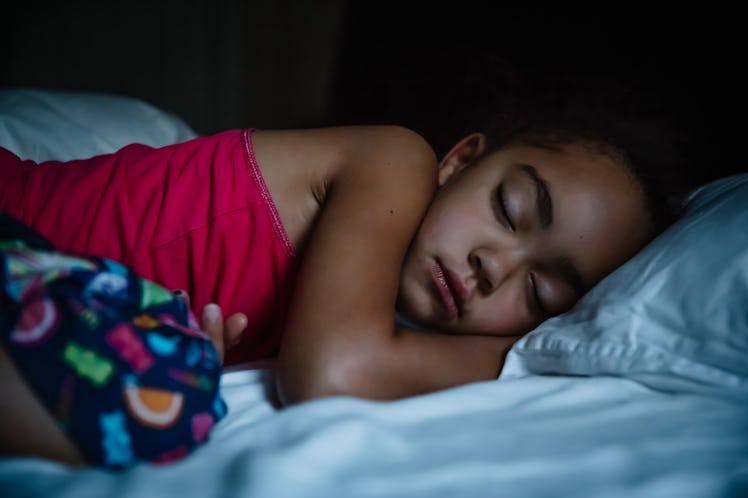Is It Safe To Give Kids Melatonin — And Does It Really Help Them Sleep?
If your kid is having trouble sleeping, melatonin shouldn’t be the first thing you reach for.

Melatonin has a reputation as an approachable and natural sleep aid because the active ingredient is a synthetic version of a hormone the body naturally produces that makes us to feel drowsy and tired at night. But is melatonin safe for kids? The American Academy of Pediatrics (AAP) recently released a health advisory on the use of melatonin by kids and teens. Why? Experts say that a melatonin tablet isn’t as close to a simple cup of chamomile as manufacturers would have you believe — and that parents should think twice before considering melatonin for their kids.
Laura Sterni, M.D., director of the Johns Hopkins Pediatric Sleep Center, says she sees “kid after kid” on melatonin. “But one of the things I always try and tell parents is: We don’t know,” she says. “We haven’t taken large groups of kids and given them melatonin and looked at what happened.”
One of Sterni’s main concerns with pharmaceutical melatonin writ large — and one of the main points of concern in the AAP health advisory — is how little it’s regulated. Because the pill is formally classified as a dietary supplement rather than a medication, FDA oversight is lax.
One study from 2017 found that 71% of melatonin supplements contained an amount of active ingredient that mismatched the amount stated on the label by at least a 10% margin. Of the 31 supplements the research team looked at, concentrations varied from 83% less than to 478% more than the labeled amount.
Even different lots by the same manufacturers could contain different concentrations of the hormone. And those with the greatest variability were melatonin chewables — the form kids are most likely to take. Some of the products even contained prescription-only medications, according to the AAP.
Luckily, one thing you don’t have to worry about is your child taking too high of a dosage. An accidental melatonin “overdose” will make your child groggy at worst.
Sign up for the Fatherly newsletter to get expert advice about fitness, gear, travel, style, parenting, and more in your inbox.
A large body of research on melatonin in adults has found little risk of side effects from taking melatonin. But there is no guarantee that the same is true for children, who could be more affected by side effects such as residual drowsiness or bedwetting. It’s more likely that any unknown risks lurk in long-term usage.
“I mean, it is a hormone,” Sterni says. “So people worry about the effect on the whole hormonal axis. But again, we don’t have those studies.” A few studies in adults, she says, have identified a potential link between large amounts of supplemental melatonin and slowed metabolism.
So is it ever okay to give kids melatonin? Absolutely, Sterni says — if, and only if, a doctor has recommended it. It’s partially about safety, but it’s also about not slapping a hormonal band-aid on a bigger problem.
“When you’re looking at children who are having difficulty falling asleep or staying asleep, the huge, huge majority of those children are having what we call behavioral insomnia: behavioral problems or sleep hygiene problems that lead to the difficulty with sleep. And giving them a medication is not solving the problem.”
Instead of reaching for melatonin, she says, parents should think about why a child is having a hard time sleeping. Are they winding down and putting away electronics an hour before bed? Is their room dark and cool? Are they getting enough movement in during the day? Although sleep hygiene concerns like these aren’t always the easiest to perfect, they’re often the best place to start.
If your child shows patterns of sleep issues beyond a wired night here or there, ask their doctor about more specific strategies, which may include trying low doses of melatonin from a manufacturer that they recommend.
Studies do show that melatonin can help some children with autism, ADHD, and circadian rhythm disorders, whose bodies may not naturally produce enough melatonin at the correct times of day. And there are a number of other conditions that doctors may suggest the use of melatonin to address.
“I just can’t stress enough that it’s worth talking to your doctor first,” Sterni says.
This article was originally published on